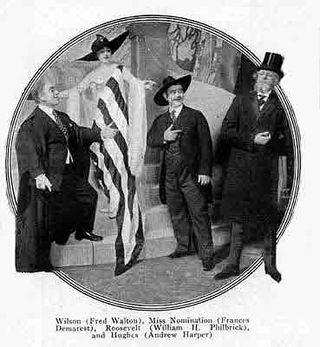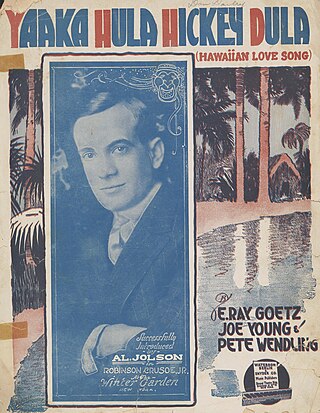
Otto Abels Harbach, born Otto Abels Hauerbach was an American lyricist and librettist of nearly 50 musical comedies and operettas. Harbach collaborated as lyricist or librettist with many of the leading Broadway composers of the early 20th century, including Jerome Kern, Louis Hirsch, Herbert Stothart, Vincent Youmans, George Gershwin, and Sigmund Romberg. Harbach believed that music, lyrics, and story should be closely connected, and, as Oscar Hammerstein II's mentor, he encouraged Hammerstein to write musicals in this manner. Harbach is considered one of the first great Broadway lyricists, and he helped raise the status of the lyricist in an age more concerned with music, spectacle, and stars. Some of his more famous lyrics are "Smoke Gets in Your Eyes", "Indian Love Call" and "Cuddle up a Little Closer, Lovey Mine".
This is a list of notable events in music that took place in the year 1918.
This is a list of notable events in music that took place in the year 1915.

Jean Schwartz was a Hungarian-born Jewish American composer and pianist. He is best known for his work writing the scores for more than 30 Broadway musicals, and for his creation of more than 1,000 popular songs with the lyricist William Jerome. Schwartz and Jerome also performed together on the vaudeville stage in the United States; sometimes in collaboration with Maude Nugent, Jerome's wife, and the Dolly Sisters. Schwartz was married to Jenny Dolly from 1913 to 1921.

Sigmund Romberg was a Hungarian-born American composer. He is best known for his musicals and operettas, particularly The Student Prince (1924), The Desert Song (1926) and The New Moon (1928).
Monte Cristo or Montecristo may refer to:

The Passing Show of 1918 is a Broadway musical revue featuring music of Sigmund Romberg and Jean Schwartz, with book and lyrics by Harold Atteridge. The show introduced the hit songs "I'm Forever Blowing Bubbles" and "Smiles".

The Passing Show of 1916 is a revue featuring the music of Sigmund Romberg and Otto Motzan, with book and lyrics by Harold Atteridge. It included the first George Gershwin songs introduced in a Broadway show.
The Dream Girl is an operetta in three acts with music by Victor Herbert and book by Rida Johnson Young and Harold Atteridge. Based on the 1906 play The Road to Yesterday, by Beulah Marie Dix and Evelyn Greenleaf Sutherland, its satiric story concerns reincarnation. Additional music was written by Sigmund Romberg. The piece was Victor Herbert's last musical composition, and the work was produced posthumously on Broadway in 1924.

Robinson Crusoe, Jr. is a musical with a book by Edgar Smith, lyrics by Harold Atteridge, and music by Sigmund Romberg and James Hanley.

Sinbad is a Broadway musical with a book and lyrics by Harold Atteridge and music by Sigmund Romberg, Al Jolson and others. Jolson plays a porter in old Bagdad where he meets a series of characters from the Arabian Nights, including Sinbad. He is transported to various exotic settings.

The Passing Show was a musical revue in three acts, billed as a "topical extravaganza", with a book and lyrics by Sydney Rosenfeld and music by Ludwig Engländer and various other composers. It featured spoofs of theatrical productions of the past season. The show was presented in 1894 by George Lederer at the Casino Theatre. It was one of the first musical revues on Broadway and led the fashion for such productions. The Casino Theatre produced a revue each summer thereafter for several seasons.
Harold Richard Atteridge was an American composer, librettist and lyricist primarily for musicals and revues. He wrote the book and lyrics for over 20 musicals and revues for the Shubert family, including several iterations of The Passing Show.
Jesse C. Huffman (1869–1935) was an American theatrical director. Between 1906 and 1932 he directed or staged over 200 shows, mostly for the Shubert Brothers. Many of them were musical revues, musicals or operettas. He is known for The Passing Show series of revues that he staged from 1914 to 1924 at the Winter Garden Theatre on Broadway, daring alternatives to the Ziegfeld Follies.

Monte Cristo Jr. was a Victorian burlesque with a libretto written by Richard Henry, a pseudonym for the writers Richard Butler and Henry Chance Newton. The score was composed by Meyer Lutz, Ivan Caryll, Hamilton Clarke, Tito Mattei, G. W. Hunt and Henry J. Leslie. The ballet and incidental dances were arranged by John D'Auban, and the theatre's musical director, Meyer Lutz, conducted. The play's doggerel verse was loosely based on The Count of Monte Cristo by Alexandre Dumas.
Harry Delf was an American comedian, stage actor, playwright, both a screen writer and director of short films, theatrical producer, and lyricist and composer for musicals. He is best remembered as the author of the play The Family Upstairs (1925) which has been staged on Broadway twice and adapted into a film multiple times. As a comedian and stage actor he performed in vaudeville and on Broadway.
Dancing Around is a two-act musical revue with music by Sigmund Romberg and Harry Carroll and lyrics and book by Harold Atteridge. The production was "the first show in which Al Jolson received top billing from the start." As a revue, the score features songs from multiple composers and lyricists, notably featuring the songs "Sister Susie's Sewing Shirts for Soldiers" and "It's a Long Way to Tipperary." However, the Grace Leboy song "Everybody Rag With Me", commonly associated with the musical in sheet music and recordings popularized by Jolson, did not appear in the original production, but rather was added during a tour. Jolson appeared in blackface, performing the "Everybody Rag With Me" number and the encore without the makeup. Performances began at the Winter Garden Theatre in New York on October 10, 1914, running for 145 performances before closing on February 13, 1915.

Innocent Eyes is a musical revue in two acts with music by Sigmund Romberg and Jean Schwartz, lyrics by Harold Atteridge and Tot Seymour, and a book by Atteridge. Produced by brothers Jacob J. and Lee Shubert, the musical premiered at the Winter Garden Theatre on May 20, 1924, where it ran for 126 performances; closing on August 30, 1924. Set in Paris, France, the work had no unifying plot and was instead a series of vignettes intended to show off the various talents of the work's stars. The production's lavish sets and costumes rivaled those of the Ziegfeld Follies; the work's chief competitor in the musical revue genre that Broadway season. Charles Gesmar designed the costumes and Watson Barratt designed the sets.
Owen Murphy was an American songwriter, film maker, and writer for radio, film, and theatre. He worked as a lyricist, composer, and playwright for Broadway musicals and as a songwriter for Tin Pan Alley in the 1920s and 1930s. As a film maker he was an early maker of industrial films. He also was a writer for comedian Joe Cook for both the stage and radio.
Monte Cristo Jr. may refer to:










